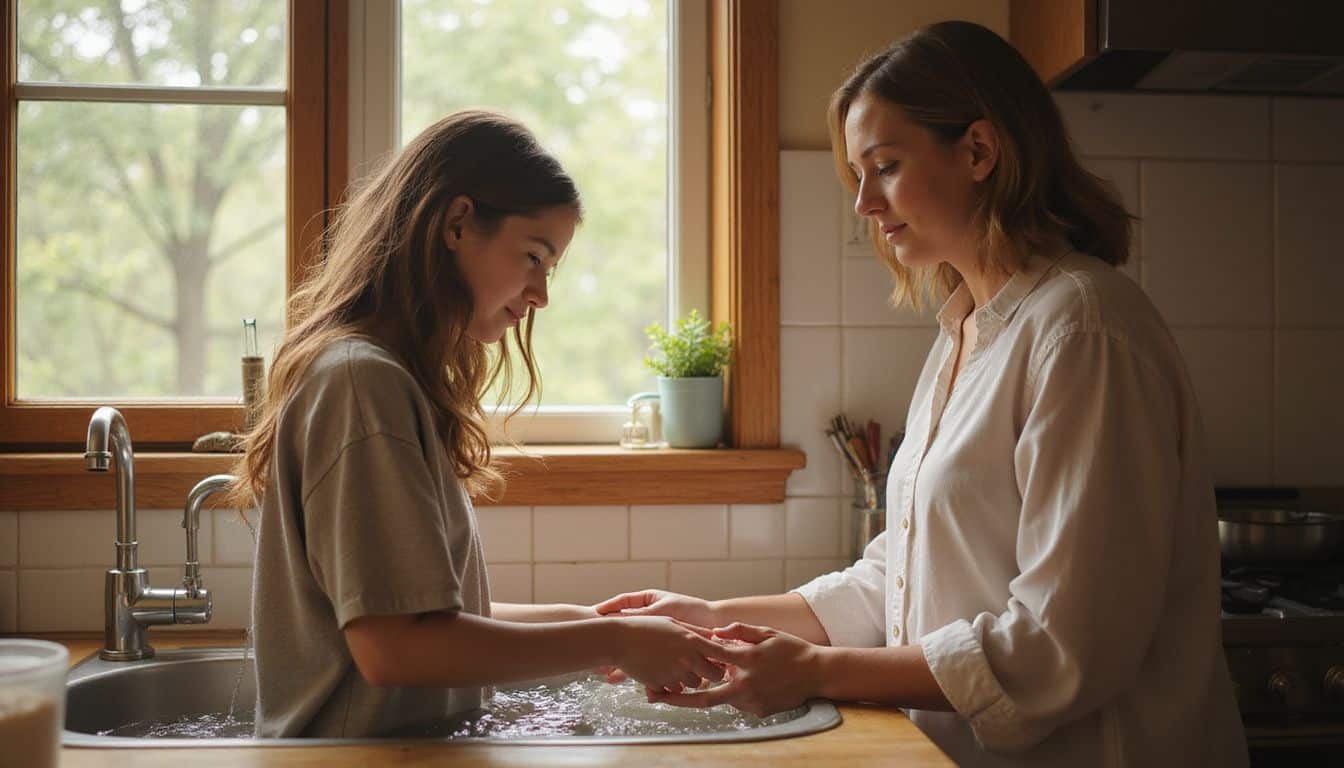Many parents feel awkward about How To Have the Sex Talk With Your Teenage Daughter. But teens actually want to hear more from parents, especially on emotional aspects of sex. This article gives you seven easy tips for open communication and parental guidance with your teen; you’ll learn how Dutch parenting helps girls form healthy attitudes toward sex education and sexual behaviors.
Keep reading to become comfortable having this important conversation!
Key Takeaways
Teenagers prefer honest, open chats about sex and emotions with parents—over 4,000 teens confirmed this preference in a 2012 study.
By age 17, more than half of teenage girls have started having sex, so relaxed talks about safe practices help lower chances of STIs and unexpected pregnancies.
Keep sex-related talks informal and comfortable—like chatting during car rides or cooking meals together—to help teens open up naturally.
By the year 2025, parents will likely rely on apps and virtual reality technology to clearly discuss tough topics like consent, while teens turn to trusted online groups through social media for additional support.
Teens hear about 14,000 sexual comments every year just from TV; nearly 70% of prime-time programs include some sexual material.
Table of Contents
Why It’s Important to Talk to Your Teen About Sex

Talking openly with your daughter about sex is more important than you realize. A 2012 survey involving over 4,000 teenagers showed that they want more information from parents—not just facts on sex, but discussions about feelings too.
Here’s the reality: more than half of girls at age 17 are sexually active. Teens who lack clear advice face higher risks of sexually transmitted infections and unplanned pregnancies.
I learned this firsthand with my daughter. Our initial conversation was awkward, sure—but it laid a path of trust, strong enough to support us through her teenage years.
Open conversations about sexuality create a foundation of trust that helps teens make better choices.
Research confirms that teens who openly talk with parents about sensitive sexual topics tend to act more responsibly. These conversations aren’t limited to birth control or disease.
They should include consent, setting healthy limits, and how media shapes our ideas about sex. Your honest advice can help teens sort out confusing messages from peers, social platforms, and pornography.
The aim isn’t controlling their decisions—it’s about offering useful tools to help them choose wisely for their bodies and relationships.
Preparing for the Conversation

Getting ready for this talk needs some prep work first. You’ll want to brush up on facts about teen sex and learn what your daughter might already know from school or friends.
Educate Yourself About Sexuality and Current Trends

Parents need clear facts before having the sex talk with teenagers—I found this out firsthand after my daughter asked questions I couldn’t answer. Research shows over 40% of kids aged 10 to 17 have seen pornography online.
By college age, about 90% of men and one-third of women report viewing porn at least once a year. Kids often start conversations about sex in fourth or fifth grade, which pick up sharply by sixth grade.
As parents, staying informed is key. Read books on teenage sexuality, or visit trusted health websites for clear guidance. Learn about safe sex, consent, and topics like whether size matters to address misconceptions.
It’s also helpful to know about apps like TikTok, where many teens find sexual information. Today’s teenagers worry about oral sex, sexting, and peer pressure—issues we didn’t face as intensely growing up.
Good information helps you challenge inaccurate ideas teens hear from friends or online. The American Academy of Pediatrics provides excellent resources for parents. Become familiar with current teen terms related to dating and sex, such as “hook-up” or “friends with benefits”.
Stay informed about contraception methods, sexually transmitted infections (STIs), and the human papillomavirus (HPV). Teens might also bring up questions on same-sex attraction, transgender identities, or masturbation.
Knowing the facts empowers you to guide your teen calmly and confidently, without fear.
Clarify Your Own Values and Beliefs

Before you sit down to talk with your teen about sex, pause first to reflect on your feelings. Your personal values play a huge role in shaping these conversations. It’s common to feel caught between teaching abstinence and giving practical advice on safer sex.
Yet, studies show abstinence-only programs rarely achieve their goals—teens from these classes have sex at the same rates as others. So, get clear on where you stand with topics like same-sex relationships, consent, and birth control.
Your teen might surprise you with challenging questions about love, faith, or sexual pleasure.
Trust is built when we share our authentic selves with our daughters, even if that means admitting we don’t have all the answers.
Think about your comfort level, too. If topics like masturbation or orgasm make you uneasy, practice saying these words quietly to yourself, before the real talk. More than half of girls have sex by age 17, so you don’t help by avoiding important issues.
Sharing honest personal experiences from your teenage years—without oversharing every detail—helps build trust and connection. Your daughter will gain the most from advice that mixes accurate health information with meaningful family values.
How to Start the Conversation
Starting the sex talk with your teen might feel scary, but timing matters more than you think. Pick a moment when you both feel calm and have privacy – maybe during a car ride or while cooking dinner together.
Choose the Right Time and Setting

Choosing the right moment to discuss sex with your daughter is just as important as the words you use. Try a calm, comfortable environment—like chatting casually in the car or preparing dinner side-by-side.
Teens often feel more relaxed and open in these informal situations. Skip busy or rushed times, and avoid tiring days; you both need to be present and at ease. Let your daughter see this isn’t a one-and-done lecture—but the start of an ongoing conversation.
Switch off phones and TVs, so your daughter knows she has your attention completely. Your body language matters too—sit beside her, at the same eye level, with a relaxed manner. Many parents naturally introduce sensitive topics through TV shows or news stories.
I’ve personally done this with my daughter, and it felt natural and much less awkward than a formal “we need to talk” moment.
Be Open and Non-Judgmental

Setting aside the right moment and location for your conversation is only part of it—your approach counts just as much. Staying open and non-judgmental lets your teen feel safe enough to share genuine thoughts about sex with you.
Honest discussions like these help combat misinformation and encourage healthy decisions about her own body. Your daughter needs assurance that she can trust you with sensitive questions, without the worry of getting criticized.
Trust grows in the soil of acceptance, not in the shadow of judgment.
Let your teen daughter see clearly that her opinions matter, even if they don’t match yours. Your respect helps her build confidence, trust, and a positive body image. It’s perfectly fine if she doesn’t have all the answers about sex yet; let her know you can search for information together.
Teens typically wonder about consent, peer pressure, and safe sex practices. Calm, clear responses to topics like pregnancy or intercourse can make future conversations easier and more comfortable.
Consider creating a private space—maybe a secure drawer or folder—where she can find sexual health resources if she’s not yet comfortable talking openly. Supporting her privacy sends a powerful message that you genuinely care about her personal growth during these important teenage years.
Key Topics to Discuss

The sex talk must cover more than just the basics. Your teen needs clear info on consent, safety, emotions, and media’s impact on their views.
Consent and Healthy Boundaries

Teaching your daughter about consent helps her understand that she is in charge of her body. Clear boundaries guard against unwanted advances and build self-respect. I’ve noticed it helps to describe consent as an ongoing, enthusiastic “yes”, instead of just the lack of a “no”.
Half of sexual assaults involve alcohol, according to studies, because drinking clouds the ability to make decisions clearly. Have open talks about how alcohol affects choices around sex.
Your teen should feel safe refusing sexual activity at any point—even if she previously said yes. Cultural expectations about consent must shift to clear, verbal agreement to protect everyone from sexual violence and support healthy teen growth.
Girls often feel pressure about sex from friends, social groups, and media. Talk about recognizing the difference between respectful behavior and manipulative actions. Explain that healthy boundaries include staying clear of peeping toms or anyone who violates privacy.
Help her understand that 1 in 10 high school drinkers say they were pressured or forced into sexual intercourse. These facts can feel uncomfortable—but they can also help her spot risky situations and protect herself better.
Safe Sex Practices and Protection

Teens need clear, honest facts about protection to avoid pregnancy and sexually transmitted infections. Birth control offers plenty of options—pills, patches, rings, implants, and IUDs.
Your daughter should also know that many states allow teens to get birth control without parent approval. It’s not about giving her the green light for sex, but about staying safe.
She needs to understand clearly that birth control prevents pregnancy, but won’t prevent STIs. Condoms are a must, along with other methods, to fully protect against pregnancy and infection.
Sex education means having open, honest discussions about consent and the risks tied to sex outside marriage. Talk openly about how HPV infections can harm cervical health. Explain clear safety steps for both vaginal and anal sex.
Many teens feel pressure from peers to have sex before they feel ready. Help your daughter set healthy limits and make sure she knows how to stay safe if she chooses to become sexually active.
The aim isn’t to frighten her—but to protect her from becoming a single mom before she’s ready for that kind of responsibility.
Emotional Aspects of Sexual Relationships

Sex is about much more than physical acts alone—it also includes deep emotional connections. Your daughter should know how feelings play into sexual experiences. Young people often jump into sex without reflecting on their emotions.
Girls sometimes face pressures and expectations to become sexually active before they’re truly ready. It’s helpful to discuss with your daughter how sex can build powerful emotional ties with partners.
Those connections may make breakups more painful and complicated. Sexual decisions can bring both joy and regret, even years down the road. Many young adults overlook how casual encounters often cause emotional stress and unease.
Alcohol frequently affects sexual decisions among teenagers. Many girls say they drink alcohol before casual sex because it eases social tension. But this habit can create problems, like confusion around consent and higher risks of unwanted sexual contact.
Help your daughter see that safe and respectful sexual relationships depend on clear consent, open communication, and genuine respect. Feeling relaxed and valued usually creates more enjoyable sexual experiences for both partners.
Giving your daughter a safe place to openly share feelings and concerns builds her trust in you as a parent. You can also explain how friends and popular media shape people’s views and attitudes about sexuality.
The Role of Media and Peer Pressure

Media constantly floods teens with sexual messages. Your daughter encounters roughly 14,000 sexual references every year on television alone—and nearly 70% of prime-time programs feature sexual content.
This massive flow of messages shapes teen perspectives on bodies, relationships, and intimacy. Friends amplify or soften these impressions, depending on their personal feelings around sex.
Celebrities also share conflicting messages on sexuality, influencing your teen’s views. Popular figures like Beyoncé, Nicki Minaj, and Miley Cyrus each express different attitudes toward female sexuality, potentially adding confusion.
On top of this, social media exposes teens to more pressure about how to handle sexual choices. Have honest talks with your daughter about these outside influences, and encourage critical thinking.
Chat openly about how media often skips showing emotional realities around intimacy, and leaves out the key topic of consent in caring relationships.
Maintaining an Ongoing Dialogue

Sex talks work best as a series, not a one-time event. Keep channels clear for your teen to ask questions as they grow and face new situations in their journey.
Keep the Door Open for Future Conversations

Talking about sex isn’t just a one-time conversation. I always remind my daughter she can ask me anything, whenever she wants. This relaxed, open-door approach builds trust, showing teens their concerns about sexuality matter to you.
Often, teens like to bring things up in small pieces—maybe in the car, or even while running errands. Little conversations like these add up over time, leading teens toward safer choices and deeper understanding.
Studies even show teens who openly chat with parents about sex tend to have fewer unplanned pregnancies and sexually transmitted infections.
Create an accepting space, one where your daughter can discuss feelings—whether they’re uneasy or pleasant—without embarrassment. My teen asked about consent once, as we stood side by side washing dishes.
Luckily, I stayed calm, gave her clear, honest answers, and we continued chatting naturally. Ongoing conversations help teens set clear boundaries and understand issues like dating pressures and sexual assault better.
Being open about teen development today shapes how comfortably your child handles relationships tomorrow. Next, we’ll see how to encourage teens to ask openly and give honest responses that honor their maturity level.
Encourage Questions and Provide Honest Answers

Teens deserve a safe, judgment-free space to discuss sex openly. More than half of teens turn to friends for sexual information, which can result in misinformation. You can interrupt this cycle by welcoming questions and giving clear, honest answers.
Try responding to her curiosity with phrases like, “I’m glad you asked that”, or “That’s a smart question”, to show you value open conversation. Keep helpful books, reliable websites, and trusted apps close, in case certain topics are new to you.
Straightforward answers from parents help build lasting trust with teens during these important years. Being open about your beliefs around sex helps your daughter feel comfortable asking real questions.
You don’t need to reveal personal details, but explaining your values openly—while respecting her independence—paves the way for healthy talks. Showing acceptance of different ideas about sexuality and gender identity encourages truthful and open communication.
If she brings up something you can’t answer, gently say, “I’m not sure, but let’s find out together”, then use it as a chance to learn together as a team.
How Will Conversations About Teen Sexuality Evolve in 2025?

By 2025, talking openly with adolescents about sexuality will become simpler and more tech-focused. Parents will rely increasingly on apps and virtual reality tools to clearly explain sensitive topics, like consent and gender identity, without discomfort.
Social media, too, will become a bigger part of the conversation—offering trusted online communities where teens can comfortably discuss sexual health topics without embarrassment.
These digital places will cover everything from same-sex relationships to ways to protect against HPV infections, creating a relaxed setting that’s easier than face-to-face interactions.
Future conversations will also cover emotional health, not just physical details. Subjects like pleasure, low libido, and how social media affects body image will be routine parts of these talks.
In schools, sex education classes will move beyond basic abstinence-only teachings. Instead, they will include helpful guidance on setting healthy boundaries and recognizing signs of date rape situations.
At home, parents will have better resources to discuss transgender topics and help their teens confidently handle peer pressure about sexual activity. The goal will shift beyond pregnancy prevention to giving teens knowledge and confidence for lifelong sexual fulfillment.
People Also Ask
What’s the best age to start talking about sex with my daughter?
Start having open conversations in the late elementary to early middle school years—before puberty fully kicks in. Kids naturally become curious about sexuality at this age. Early talks help build trust, making more difficult conversations down the road easier.
How can I talk about abstinence without sounding judgmental?
Discuss abstinence as one healthy and responsible choice—but not the only choice out there. Explain that waiting to have sex can help avoid pregnancy and infections, including HPV. Make sure your daughter knows you’ll support her, whatever decision she makes.
Should I include same-sex relationships when talking to my teenager about sexuality?
Yes. Openly discussing sexuality means including topics like same-sex attraction and gender identity. Many teens naturally question their own feelings and attractions at some point. Your acceptance and openness make a big difference for her well-being and happiness.
What topics are important to cover in discussions about consensual sex?
Clearly explain the importance of both partners agreeing fully—and clearly—to sexual activity. Talk about how alcohol or drugs can cloud judgment and decision-making. Also, let her know that pleasure is natural but always needs mutual respect. Use relatable examples that make sense within your family’s culture and values.
How can I approach conversations about birth control without sounding like I’m giving permission?
Keep your talks focused on health and safety, not permission. Explain different birth control methods simply and clearly—mention intrauterine devices, pills, or condoms. A sex educator once explained it perfectly: “Having knowledge keeps you protected; it isn’t the same as permission”.
What should I do if I accidentally catch my daughter masturbating?
Stay calm and respect her privacy—it’s completely normal for teens to explore their bodies. Later on, briefly and casually let her know that self-exploration is natural, healthy, and private. Keep it relaxed, short, and simple.
References
https://parentandteen.com/help-parents-talk-comfortably-about-sex/
https://teentherapyoc.com/how-to-talk-about-sex-with-your-teenager/
https://www.plannedparenthood.org/learn/parents/tips-talking
https://www.whallc.com/wellness/talking-to-your-teen-about-sexuality-consent-and-other-sensitive-topics/ (2024-02-12)
https://pmc.ncbi.nlm.nih.gov/articles/PMC10195043/
https://childmind.org/article/how-talk-kids-sex-consent-boundaries/ (2025-04-18)
https://axis.org/resource/a-parent-guide-to-kicking-off-the-sex-talk-six-conversations/
https://www.cptriad.com/teens/Talking-With-Your-Teen-About-Sex
